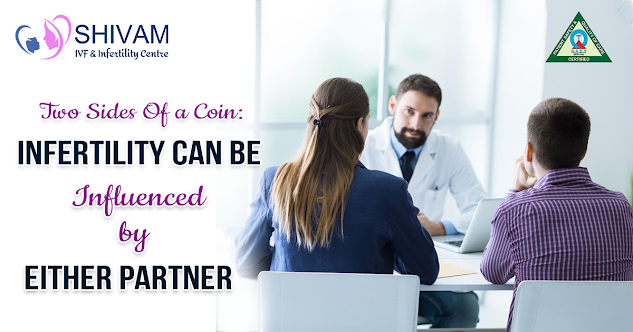Two sides of a coin: Infertility can be influenced by either partner
The word infertility states that a couple hasn’t been able to
get pregnant after at least a year of trying. Fertility is not women-centric as
it is a two-member balancing act, men can be infertile too, in fact, men and
women are equally likely to have fertility complications. Not being able to
conceive is not always linked to disease. Infertility-related complications can
easily be addressed by Dr. Bhavana Mittal.
Some specific types of infertility cannot be prevented as they
may be inherited, thus such form of infertility is unavoidable. In some cases,
a woman who’s never been able to get pregnant will be diagnosed with primary
infertility. Women having at least one pregnancy in the past will be diagnosed
with secondary infertility.
Male infertility is focused on complications such as inherited
disorder, hormonal imbalance, dilated testicles, or a condition that blocks the
passage of sperm leading to illness, injuries, and chronic health problems
which can be resolved if engaged with the Best IVF center in Delhi.
Causes
for female infertility
Tubal
factor Infertility
Usually, the fallopian tubes may be completely or partially
blocked, mostly commonly, the tubes are damaged as a result of infection. Few
other causes can be adhesions, ectopic pregnancies after surgery, or
spontaneous proliferation of the endometrium.
Antibodies
against sperm
In rare cases, the body isn’t able to identify its oocytes, in
such cases, the immune system produces antibodies against them. They restrict
sperm to travel, as the production of the man’s sperm in the cervical mucus
occurs more frequently. This leads no sperm cells to find their way into the
fallopian tubes making fertilization impossible.
Complications
of uterus & ovulation
It includes polyps, fibroid, septum, or adhesions inside the
cavity of the uterus. Polyps and fibroids can form on their own at any time, on
the other hand, abnormalities like septum are present at birth.
There are a lot of reasons as well to why women may not ovulate
regularly. Hormonal imbalance, previous dieting disorder, substance abuse,
thyroid conditions, and pituitary tumors are examples of things that might
affect ovulation for which guidance from the IVF Centre is a
must.
Treatment
If you as a couple are trying to get pregnant and haven’t been
able to, you may wish to seek treatment. The treatments can depend on a variety
of factors.
- The
health of both the partners.
- Age
of both the partners.
- The
root cause of infertility.
- Duration in which couple has been trying to mate.
Medications
Medications that regulate or stimulate ovulation are known
as fertility drugs. They generally work like natural
hormones-follicle-stimulating hormone and luteinizing-to trigger ovulation.
They’re also used in women who ovulate to try to stimulate a better egg.
Drugs are-
Ø Gonadotropins.
Ø Metformin.
Ø Letrozole.
Ø Bromocriptine.
Causes for male fertility
The most frequent disorder of male fertility is the impaired
production of normal and motile sperm in the seminiferous tubules. The normal
quality of the male sperm means that the number of sperm cells is above 20
million per ML. 30% of the sperm should be normal-formed sperm and at least 50%
should show good morality. However, a functional disorder may also prevent sperm
entry into the oocyte, even if the results of the semen analysis are normal.
Few other factors are endocrine disorder, stress, environmental pollution,
undescended testicles, and surgery for cancer, such as DNA damage. Temporary
impairment of sperm quality may also be due to acute infections.
Sperm transport
complications
This
situation is similar to an obstruction of the fallopian tubes in women. A
blockage of the epididymis may be the result of inflammation and the cause may
be a previous vasectomy.
Involvement of both
partners
In approximately 15 to 30 % of the affected couples, the causes
of infertility can be found in both partners. In 5 to 10% no organic cause can
be found neither in the man nor in women, in such situations stress may be the case
.
Treatment
Surgery can fix obstructions that are preventing sperm from
being present in the ejaculate. It can also correct conditions such as
varicocele.
Medications can be used to treat issues such as hormonal
imbalances. There is a treatment namely ART treatment in which eggs and sperm
are handled outside of the body. It can include treatment such as (IVF) and
intracytoplasmic sperm injection for which professional medical advice is
needed from an ICSI clinic.
Few remedies that work-
- Exercising
regularly.
- Take
adequate Vitamin C
- Relax
and minimize stress.
- Get
enough vitamin D
- Take
fenugreek supplements.
- Zinc
intake is a must.
Infertility is common and it affects a lot of couples throughout
the world, one thing that can be done for some serious results is improving
general health. Many of the tips mentioned above are key components of a
healthy lifestyle. A major issue that supports infertility is nutrient
deficiency or low testosterone levels.




Comments
Post a Comment